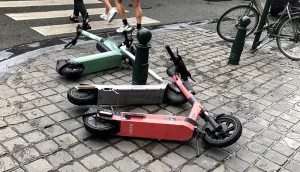
Innovation in battery recycling is needed, it seems. Scooters left lying on the streets of Brussels paint a vivid picture of the care and consideration taken over this high-tech form of transport. Could this level of care be part of the reason for the proliferation of lithium battery fires that were being discussed at the International Congress on Battery Recycling (ICBR) held this year in Salzburg. Vic Giles asks if lithium batteries should be treated as the ‘problem child’ of the battery industry.
There is no doubt in the mind of this writer that lithium batteries have the potential for great good, but also great harm. The ‘problem child’ needs to be well managed if society is to be spared the worst of its behaviour.
In his opening address at the International Congress on Battery Recycling (ICBR), the chairman of the steering committee, Arie de Jong, set a challenging, if somewhat dismal, scene for the state of lithium battery recycling in Europe.
“Expect new challenges,” he said. “Who among us dared to predict last year that an energy crisis would hit a large part of Europe? CO2 targets are untenable for many countries, as we rely again on high CO2-emitting fossil energy sources. In addition, the price of energy has exploded, which is a huge burden for the battery industry, since a lot of energy is needed for processing discarded batteries.”
He said the capacity for recycling lithium batteries in Europe is very limited. Last year there were several calamities that worsened the situation.
“For collecting organisations, it is a huge challenge to have to collect the batteries to be recycled because the factories cannot take them in for processing after calamity.
“And speaking from experience, I know that lithium iron phosphate and lithium thionyl chloride batteries are hardly processed by any European recycling plant.” Exporting lithium batteries for processing outside the OECD countries has become virtually impossible as authorities increasingly classify them as hazardous waste with all the associated restrictions, he added.
He went on to say that battery regulation is another challenge facing EU countries. New battery categories will be defined in terms of waste, battery passport, use of recycled materials, carbon footprint, recycling percentage of various materials, and strict rules for industrial batteries and collection percentage for portable batteries of 65%. And that is very far away from the actual result of many compliance schemes.
“Also, safety is a huge challenge,” he said. “Fires caused by lithium batteries are reported from all around the world. We can’t get around it. There’s work to be done in many areas to increase the safety around lithium batteries. Of course, lithium batteries should be prevented from ending up in household waste, scrap collected or anywhere else where it does not belong. There are also measures employed at collection and sorting companies and fire detection is necessary. Discarded e-bike batteries are often identified as the cause of fire.”
Innovation in battery recycling is needed, he said. Many materials are still being lost and the upcoming battery regulation in the EU will probably require a high recycling rate.
Source: BEST magazine, November 3, 2022